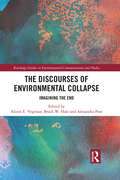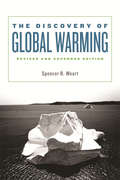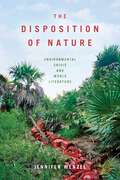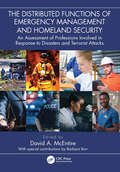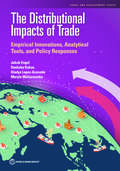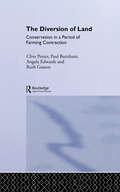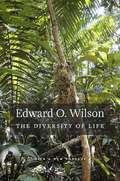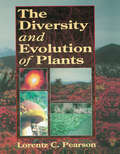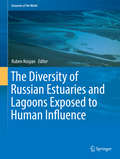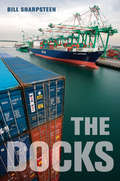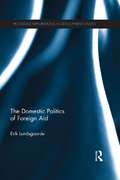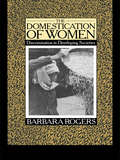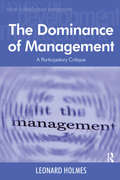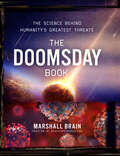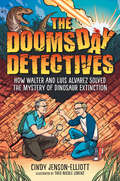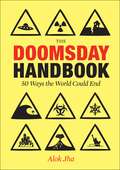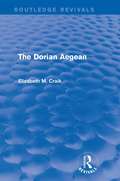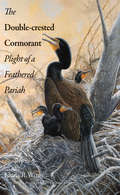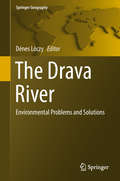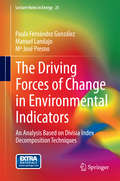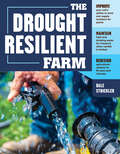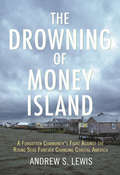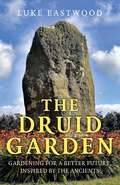- Table View
- List View
The Discourses of Environmental Collapse: Imagining the End (Routledge Studies in Environmental Communication and Media)
by Alexandra Peat Alison E. Vogelaar Brack W. HaleIn recent years, ‘environmental collapse’ has become an important way of framing and imagining environmental change and destruction, referencing issues such as climate change, species extinction and deteriorating ecosystems. Given its pervasiveness across disciplines and spheres, this edited volume articulates environmental collapse as a discursive phenomenon worthy of sustained critical attention. Building upon contemporary conversations in the fields of archaeology and the natural sciences, this volume coalesces, explores and critically evaluates the diverse array of literatures and imaginaries that constitute environmental collapse. The volume is divided into three sections— Doc- Collapse, Pop Collapse and Craft Collapse —that independently explore distinct modes of representing, and implicit attitudes toward, environmental collapse from the lenses of diverse fields of study including climate science and policy, cinema and photo journalism. Bringing together a broad range of topics and authors, this volume will be of great interest to scholars of environmental communication and environmental humanities.
The Discovery Of Global Warming: New Histories of Science, Technology, and Medicine
by Spencer R. WeartThe award-winning book is now revised and expanded. In 2001 an international panel of distinguished climate scientists announced that the world was warming at a rate without precedent during at least the last ten millennia, and that warming was caused by the buildup of greenhouse gases from human activity. The story of how scientists reached that conclusion-by way of unexpected twists and turns-was the story Spencer Weart told in The Discovery of Global Warming. Now he brings his award-winning account up to date, revised throughout to reflect the latest science and with a new conclusion that shows how the scientific consensus caught fire among the general world public, and how a new understanding of the human meaning of climate change spurred individuals and governments to action.
The Discovery of Global Warming: Revised and Expanded Edition (New histories of science, technology, and medicine #13)
by Spencer R. WeartThe award-winning book is now revised and expanded. In 2001 an international panel of distinguished climate scientists announced that the world was warming at a rate without precedent during at least the last ten millennia, and that warming was caused by the buildup of greenhouse gases from human activity. The story of how scientists reached that conclusion—by way of unexpected twists and turns—was the story Spencer Weart told in The Discovery of Global Warming. Now he brings his award-winning account up to date, revised throughout to reflect the latest science and with a new conclusion that shows how the scientific consensus caught fire among the general world public, and how a new understanding of the human meaning of climate change spurred individuals and governments to action.
The Disposition of Nature: Environmental Crisis and World Literature
by Jennifer WenzelFinalist, 2022 Ecocriticism Book Prize, Association for the Study of Literature and the EnvironmentShortlisted, 2020 Book Prize, Association for the Study of the Arts of the PresentHow do literature and other cultural forms shape how we imagine the planet, for better or worse? In this rich, original, and long awaited book, Jennifer Wenzel tackles the formal innovations, rhetorical appeals, and sociological imbrications of world literature that might help us confront unevenly distributed environmental crises, including global warming.The Disposition of Nature argues that assumptions about what nature is are at stake in conflicts over how it is inhabited or used. Both environmental discourse and world literature scholarship tend to confuse parts and wholes. Working with writing and film from Africa, South Asia, and beyond, Wenzel takes a contrapuntal approach to sites and subjects dispersed across space and time. Reading for the planet, Wenzel shows, means reading from near to there: across experiential divides, between specific sites, at more than one scale.Impressive in its disciplinary breadth, Wenzel’s book fuses insights from political ecology, geography, anthropology, history, and law, while drawing on active debates between postcolonial theory and world literature, as well as scholarship on the Anthropocene and the material turn. In doing so, the book shows the importance of the literary to environmental thought and practice, elaborating how a supple understanding of cultural imagination and narrative logics can foster more robust accounts of global inequality and energize movements for justice and livable futures.
The Distributed Functions of Emergency Management and Homeland Security: An Assessment of Professions Involved in Response to Disasters and Terrorist Attacks
by David A. McEntireThe Distributed Functions of Emergency Management and Homeland Security outlines the roles and responsibilities of various individuals and agencies involved in homeland security and all aspects of emergency management. Each chapter focuses on the practical and applied aspects of a range of public servants in various departments and the organizations that they represent. Rather than presenting a theoretical exploration alone, the book examines the practical knowledge and hands-on skills related to various functions and how their decisions and actions play into the larger framework of safety and security —in the public, private and nonprofit sectors. Every professional has a unique and integral part to play in fulfilling their roles and obligations, whether it be in relation to prevention, mitigation, preparedness, response or recovery operations. Personnel that frequently come to mind in such scenarios include emergency managers, geographers and land-use planners, EMTs and paramedics, fire fighters, police officers, public health officials, nurses, public administrators, and public information officers. And while these individuals are integral to homeland security and emergency management, there are other professionals that also perform essential duties that—while they aren’t first-to-mind—are vital to efforts relating to terrorism and disasters; this includes pilots in the aviation sector, the military, attorneys, psychologists, and forensic professionals serving in pathology, DNA, and dentistry roles. Chapters provide a holistic rendering of the homeland security and emergency management landscape to present all these various professional capabilities and contributions. This includes how current functions are coordinated as well as how future efforts might change relative to a more proactive, all-hazards and holistic approach. As such, the book will be a useful resource for students and practitioners to understand the dynamic professions—and various disciplines and fields—that impact disaster and terrorism preparedness and response capabilities.
The Distributional Impacts of Trade: Empirical Innovations, Analytical Tools, and Policy Responses (Trade and Development)
by Gladys Lopez-Acevedo Jakob Engel Deeksha Kokas MaliszewskaTrade is a well-established driver of growth and poverty reduction.But changes in trade policy also have distributional impacts that create winners and losers. It is vital to understand and clearly communicate how trade affects economic well-being across all segments of the population, as well as how policies can more effectively ensure that the gains from trade are distributed more widely. The Distributional Impacts of Trade: Empirical Innovations, Analytical Tools, and Policy Responses provides a deeper understanding of the distributional effects of trade across regions, industries, and demographic groups within countries over time. It includes an overview (chapter 1); a review of innovations in empirical and theoretical work covering the impacts of trade at the subnational level (chapter 2); highlights from empirical case studies on Bangladesh, Brazil, Mexico, South Africa, and Sri Lanka (chapter 3); and a policy agenda to improve distributional outcomes from trade (chapter 4). This book comes at a time when the shock from COVID-19 (coronavirus) adds to an already uncertain trade policy environment in which the value of the multilateral trading system has been under increased scrutiny. A better understanding of how trade affects distributional outcomes can lead to more inclusive policies and support the ability of countries to maximize broad-based benefits from trade.
The Diversion of Land: Conservation in a Period of Farming Contraction (The Natural Environment: Problems and Management)
by Clive Potter Bryn Green Angela Edwards C. Paul Burnham Ruth GassonEuropean agriculture is on the brink of a financial and ecological crisis. The authors assess the challenge facing policy makers and those involved in the industry, arguing for the preparation of an environmental agenda based on land organisation and diversion.
The Diversity Of Life
by Edward O. WilsonView a collection of videos on Professor Wilson entitled "On the Relation of Science and the Humanities" "In the Amazon Basin the greatest violence sometimes begins as a flicker of light beyond the horizon. There in the perfect bowl of the night sky, untouched by light from any human source, a thunderstorm sends its premonitory signal and begins a slow journey to the observer, who thinks: the world is about to change. " Watching from the edge of the Brazilian rain forest, witness to the sort of violence nature visits upon its creatures, Edward O. Wilson reflects on the crucible of evolution, and so begins his remarkable account of how the living world became diverse and how humans are destroying that diversity. Wilson, internationally regarded as the dean of biodiversity studies, conducts us on a tour through time, traces the processes that create new species in bursts of adaptive radiation, and points out the cataclysmic events that have disrupted evolution and diminished global diversity over the past 600 million years. The five enormous natural blows to the planet (such as meteorite strikes and climatic changes) required 10 to 100 million years of evolutionary repair. The sixth great spasm of extinction on earth--caused this time entirely by humans--may be the one that breaks the crucible of life. Wilson identifies this crisis in countless ecosystems around the globe: coral reefs, grasslands, rain forests, and other natural habitats. Drawing on a variety of examples such as the decline of bird populations in the United States, the extinction of many species of freshwater fish in Africa and Asia, and the rapid disappearance of flora and fauna as the rain forests are cut down, he poignantly describes the death throes of the living world's diversity--projected to decline as much as 20 percent by the year 2020. All evidence marshaled here resonates through Wilson's tightly reasoned call for a spirit of stewardship over the world's biological wealth. He makes a plea for specific actions that will enhance rather than diminish not just diversity but the quality of life on earth. Cutting through the tangle of environmental issues that often obscure the real concern, Wilson maintains that the era of confrontation between forces for the preservation of nature and those for economic development is over; he convincingly drives home the point that both aims can, and must, be integrated. Unparalleled in its range and depth, Wilson's masterwork is essential reading for those who care about preserving the world biological variety and ensuring our planet's health.
The Diversity and Evolution of Plants
by Lorentz C. PearsonThis exciting new textbook examines the concepts of evolution as the underlying cause of the rich diversity of life on earth-and our danger of losing that rich diversity. Written as a college textbook, The Diversity and Evolution of Plants introduces the great variety of life during past ages, manifested by the fossil record, using a new natural classification system. It begins in the Proterozoic Era, when bacteria and bluegreen algae first appeared, and continues through the explosions of new marine forms in the Helikian and Hadrynian Periods, land plants in the Devonian, and flowering plants in the Cretaceous. Following an introduction, the three subkingdoms of plants are discussed. Each chapter covers one of the eleven divisions of plants and begins with an interesting vignette of a plant typical of that division. A section on each of the classes within the division follows. Each section describes where the groups of plants are found and their distinguishing features. Discussions in each section include phylogeny and classification, general morphology, and physiology, ecological significance, economic uses, and potential for research. Suggested readings and student exercises are found at the end of each chapter.
The Diversity of Russian Estuaries and Lagoons Exposed to Human Influence
by Ruben KosyanThis volume describes the complex characteristics of almost all Russian coastal estuaries systematized in the following regions: the coasts of the White Sea, the Barents Sea, the Kara Sea, the Laptev Sea, the East Siberian Sea, the Chukchi Sea, the Black Sea, the Sea of Azov, the Baltic Sea, the Sea of Okhotsk, the Sea of Japan and the Bering Seas. The part on the Baltic Sea includes a detailed description of the Kaliningrad coast and the Gulf of Finland. Apart from the geology and morphology, this book also looks at the anthropogenic effects on shores as well as at hydrological conditions, local climate and water level characteristics, and at economic use of lagoons.
The Docks
by Bill SharpsteenThe Docks is an eye-opening journey into a giant madhouse of activity that few outsiders ever see: the Port of Los Angeles. In a book woven throughout with riveting novelist detail and illustrated with photographs that capture the frenetic energy of the place, Bill Sharpsteen tells the story of the people who have made this port, the largest in the country, one of the nation's most vital economic enterprises. Among others, we meet a pilot who parks ships, one of the first women longshoremen, union officials and employers at odds over almost everything, an environmental activist fighting air pollution in the "diesel death zone," and those with the nearly impossible job of enforcing security. Together these stories paint a compelling picture of a critical entryway for goods coming into the country--the Port of Los Angeles is part of a complex that brings in 40% of all our waterborne cargo and 70% of all Asian imports--yet one that is also extremely vulnerable. The Docks is a rare look at a world within our world in which we find a microcosm of the labor, environmental, and security issues we collectively face.
The Domestic Politics of Foreign Aid (Routledge Explorations in Development Studies)
by Erik LundsgaardeIn spite of shared rhetorical commitments to tackling poverty worldwide, donors have varied considerably in their use of aid as an instrument for global poverty reduction. This book explains varied donor priorities by examining how societal actors, governmental actors, and the institutions that regulate their interactions influence development policy choices. The Domestic Politics of Foreign Aid challenges explanations for donor generosity that identify humanitarian values, partisan politics, and welfare state institutions as key determinants of aid-giving patterns. It explains how the preferences of diverse sets of actors are amalgamated in the domestic political arena to shape national preferences for international redistribution. Drawing on interview research conducted with a variety of stakeholders in four donor countries (Denmark, France, Switzerland and the United States) and an extensive review of primary and secondary sources on aid politics in the countries studied, the book offers both a static overview of the characteristics of aid policymaking systems and a historical treatment of policymaking dynamics over a 25-year period (1980-2005). Applying a common theoretical framework to the four case studies and using development NGO advocacy as a starting point for examining the politics of aid, this book provides a synthesis of several strands of theoretical work dealing with interest group politics and political institutions to inform the analysis of the societal and governmental determinants of aid choices.
The Domestication of Women: Discrimination in Developing Societies (Social Science Paperback Ser. #Vol. 213)
by Barbara Rogers"The Domestication of Women is a feminist critique of international development agencies and programs. A researcher in development studies with past experience as a United Nations consultant, Barbara Rogers writes with a note of outrage about the pervasive biases against women that lead to wasteful and destructive bungling on the part of Western and Westernized men who dominate the field of development planning." - Amy Burce (Stanford University), Signs
The Dominance of Management: A Participatory Critique (Voices in Development Management)
by Leonard HolmesThis book offers a controversial reanalysis of the rise and dominance of managerialist approaches to development. Linking two British inner-city community development projects with projects in the developing world it shows how ’managed development’ runs counter to participatory values and aspirations of communities receiving development aid. This, in effect, mutes the voices of these communities. In conclusion, Holmes draws implications for the emerging community development agenda in urban development throughout the world.
The Doomsday Book: The Science Behind Humanity's Greatest Threats
by Marshall BrainHow might the world as we know it end? In this illustrated guide, How Stuff Works author Marshall Brain explores myriad doomsday scenarios and the science behind them. What if the unimaginable happens? A nuclear bomb detonates over a major city, for example, or a deadly virus infects millions around the world. There are other disasters we don&’t even have to imagine because they&’ve already occurred, like violent hurricanes or cataclysmic tsunamis that have caused horrific loss of life and damage. In The Doomsday Book, Marshall Brain explains how everything finally ends—the decimation of nations and cities, of civilization, of humanity, of all life on Earth. Brain takes a deep dive into a wide range of doomsday narratives, including manmade events such as an electromagnetic pulse attack, a deadly pandemic, and nuclear warfare; devastating natural phenomena, such as an eruption from a super-volcano, the collapse of the Gulf Stream, or lethal solar flares; and science-fiction scenarios where robots take over or aliens invade. Each compelling chapter provides a detailed description of the situation, the science behind it, and ways to prevent or prepare for its occurrence. With fun graphics and eye-catching photographs at every turn, The Doomsday Book will be the last book you&’ll ever have to read about the last days on Earth.Scenarios include: - Asteroid Strike: a massive asteroid could obliterate life—just as it might have killed the dinosaurs. - Gray Goo: self-replicating nanobots engulf the planet. - Grid Attack: an attack on our power grid shuts down the internet, affecting airports, banks, computers, food delivery, medical devices, and the entire economic system. - Gulf Stream collapse: the shutdown of this important ocean current causes temperatures to plummet. - Ocean acidification: if the oceans&’ pH levels shift due to a rise in carbon dioxide, all marine life could die.
The Doomsday Detectives: How Walter and Luis Alvarez Solved the Mystery of Dinosaur Extinction
by Cindy Jenson-ElliottFather-son scientists Luis and Walter Alvarez piece together one of the greatest mysteries of all time: What really happened to the dinosaurs? Dive into this fun and informative middle grade nonfiction book, which outlines the many important scientific discoveries that aided the Alvarezes in their search for answers.Cretaceous earth was known as the age of dinosaurs. But really, it was the age of LIFE--scaled and feathered, furry and leathered, budding, blooming, roaring, zooming, buzzing, glorious LIFE--until... DOOMSDAY. For 66 million years, the mystery of what happened to the dinosaurs lay hidden under layers of sand and silt, until scientists began to piece together the puzzle of what happened on the last day of the ancient world. Follow the real-life adventures of father-son scientists Luis and Walter Alvarez--along with an army of science detectives--as they unlock the world's most intriguing mystery. Learn how the smallest particles in the universe helped explain what happened to the largest animals that ever walked the planet. Track the timelines of discoveries that had to happen in physics, paleontology, astronomy, and geology, before humans could understand how and why 75 percent of species suddenly went extinct. This is the story of how scientists add to the sum total of human knowledge, one question at a time, and help us understand our beautiful, tragic, and magnificent world.
The Doomsday Handbook
by Alok JhaWe live in a world positively teeming with threats and apocalyptic scenarios. Many of them are familiar: terrorism, deadly viruses, global warming and war, but many others most of us can't even imagine: self-replicating nanobots that can devour an entire planet, high-energy experiments that threaten to suck the Earth into a mini black hole, and even super-sophisticated scientific contraptions that can put an end to the entire universe.
The Dorian Aegean (Routledge Revivals Ser.)
by Elizabeth M. CraikThis wide-ranging yet detailed study describes and assesses the many-faceted cultural achievement of an area remote from Athens, the Dorian islands. Elizabeth Craik’s scholarship sets this lively outlying region of the ancient Greek world – which included Rhodes, Kos, Karpathos, Melos, and Thera – in the perspective of Greek civilization as a whole, demonstrating that excessive emphasis on the Athenian advancements of the fifth century BC tends to obscure the contribution of other regions. Beginning with a discussion of the geographical setting, natural resources and historical development of the area, The Dorian Aegean goes on to survey linguistic usage and local scripts, and to examine the regional contribution to literature, medicine and science. In the final three chapters, the religious traditions and practices of the islands are discussed, in terms of myths, cults and administration. This work will appeal to students of the classical world, archaeology, and cultural history.
The Double-crested Cormorant
by Linda R. WiresThe double-crested cormorant, found only in North America, is an iridescent black waterbird superbly adapted to catch fish. It belongs to a family of birds vilified since biblical times and persecuted around the world. Thus it was perhaps to be expected that the first European settlers in North America quickly deemed the double-crested cormorant a competitor for fishing stock and undertook a relentless drive to destroy the birds. This enormously important book explores the roots of human-cormorant conflicts, dispels myths about the birds, and offers the first comprehensive assessment of the policies that have been developed to manage the double-crested cormorant in the twenty-first century. Conservation biologist Linda Wires provides a unique synthesis of the cultural, historical, scientific, and political elements of the cormorant's story. She discusses the amazing late-twentieth-century population recovery, aided by protection policies and environment conservation, but also the subsequent U.S. federal policies under which hundreds of thousands of the birds have been killed. In a critique of the science, management, and ethics underlying the double-crested cormorant's treatment today, Wires exposes "management" as a euphemism for persecution and shows that the current strategies of aggressive predator control are outdated and unsupported by science.
The Down-to-Earth Guide to Global Warming
by Laurie David Cambria GordonRight now we are waking up to the reality that the effects of global warming are upon us. From extreme changes in weather patterns, to melting glaciers and polar ice caps, to endangered plant and animal species, global warming touches every aspect of our lives.
The Drava River: Environmental Problems and Solutions (Springer Geography)
by Dénes LóczyThis monograph summarizes the environmental issues concerning the channel and the floodplain of the Drava River. It describes the diverse forms of human impact (river regulation, damming and reservoirs, dredging etc.) and the environmental changes of hydrological regime, sediment transport, biodiversity etc. involved. The transboundary nature of the river is emphasized and the resulting problems are outlined. Special attention is devoted to the evolution and present condition of the floodplain (drainage pattern, oxbow lakes and their vegetation). The possible solutions to environmental problems are illustrated by a review of ongoing and planned rehabilitation measures. The book is amply illustrated with maps, cross/sections, diagrams and photographs. The international team of authors (representing all countries crossed by the Drava River: Austria, Slovenia, Croatia and Hungary) approach the topic from different aspects. Thus, the reader is provided with a comprehensive picture of this, up until now, little studied European river.
The Driving Forces of Change in Environmental Indicators
by Paula Fernández González Manuel Landajo Mª José PresnoThis book addresses several index decomposition analysis methods to assess progress made by EU countries in the last decade in relation to energy and climate change concerns. Several applications of these techniques are carried out in order to decompose changes in both energy and environmental aggregates. In addition to this, a new methodology based on classical spline approximations is introduced, which provides useful mathematical and statistical properties. Once a suitable set of determinant factors has been identified, these decomposition methods allow the researcher to quantify the respective contributions of these factors. A proper interpretation of findings enables the design of strategies and a number of energy and environmental policies to control the variables of interest. This book also analyses the impact of several factors that allow control of these variables; among them, assessment of the specific contribution of improved energy efficiency is particularly relevant. A number of divisia-index-based techniques for decomposing changes in a generic indicator are now available, and these range from classical techniques based on Laspeyres and Paasche weights to more refined approaches relying on logarithmic mean weighting schemes. This book is intended for undergraduates and graduates of energy economics and environmental sciences, environmental policy advisors, and industrial engineers.
The Drought-Resilient Farm: Improve Your Soil’s Ability to Hold and Supply Moisture for Plants; Maintain Feed and Drinking Water for Livestock when Rainfall Is Limited; Redesign Agricultural Systems to Fit Semi-arid Climates
by Dale StricklerRainfall levels are rarely optimal, but there are hundreds of things you can do to efficiently conserve and use the water you do have and to reduce the impact of drought on your soil, crops, livestock, and farm or ranch ecosystem. Author Dale Strickler introduces you to the same innovative systems he used to transform his own drought-stricken family farm in Kansas into a thriving, water-wise, and profitable enterprise, maximizing healthy cropland, pasture, and water supply. Ranging from simple, short-term projects such as installing rain-collection ollas to long-term land-management planning strategies, Strickler’s methods show how to get more water into the soil, keep it in the soil, and help plants and livestock access it. This publication conforms to the EPUB Accessibility specification at WCAG 2.0 Level AA.
The Drowning of Money Island: A Forgotten Community's Fight Against the Rising Seas Forever Changing Coastal America
by Andrew S. LewisOffers a glimpse of the future of vanishing shorelines in America in the age of climate change, where the wealthy will be able to remain the longest while the poor will be forced to leave.Journalist Andrew Lewis chronicles the struggle of his New Jersey hometown to rebuild their ravaged homes in the face of the same environmental stresses and governmental neglect that are endangering coastal areas throughout the United States. Lewis grew up on the Bayshore, a 40-mile stretch of Delaware Bay beaches, marshland, and fishing hamlets at the southern end of New Jersey, whose working-class community is fighting to retain their place in a country that has left them behind. The Bayshore, like so many rural places in the US, is under immense pressure from a combination of severe economic decline, industry loss, and regulation. But it is also contending with one of the fastest rates of sea level rise on the planet and the aftereffects of one of the most destructive hurricanes in American history, Superstorm Sandy. If in the years prior to Sandy the Bayshore had already been slowly disappearing, its beaches eroding and lowland cedar woods hollowing out into saltwater-bleached ghost forests, after the hurricane, the community was decimated. Today, homes and roads and memories are crumbling into the rising bay.Cumberland, the poor, rural county where the Bayshore is located, had been left out of the bulk of the initial federal disaster relief package post-Sandy. Instead of money to rebuild, the Bayshore got the New Jersey Department of Environmental Protection's Superstorm Sandy Blue Acres Program, which identified and purchased flood-prone neighborhoods where working-class citizens lived, then demolished them to be converted to open space. The Drowning of Money Island is an intimate yet unbiased, lyrical yet investigative portrait of a rural community ravaged by sea level rise and economic hardship, as well as the increasingly divisive politics those factors have helped spawn. It invites us to confront how climate change is already intensifying preexisting inequality.
The Druid Garden: Gardening For A Better Future, Inspired By The Ancients
by Luke EastwoodIn this age of high technology, GM foods and industrial farming, many people are looking for an alternative way to live, that honours and respects the natural world. The Druid Garden mines the deep seem of gardening through the ages and alternative modern developments, to bring the reader a method of gardening that is truly in touch with the Earth. Drawing on the knowledge of the Druids and other ancient cultures, Luke Eastwood has created a practical guide to organic and natural methods that are proven to work. Advice for the total beginner, through to the experienced, ties together Druidic wisdom with the best of gardening knowledge. Part of this book is a handy alphabetical guide to trees, shrubs and herbaceous plants, giving a wealth of information on history and folklore, as well as practical details on plant care and growing from seed. This book is invaluable to anyone serious about organic gardening or those simply interested in how things were done in former ages, Celtic Europe in particular.
